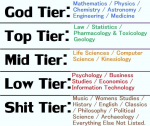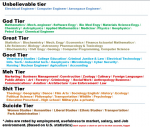MinnesotaSmith
Membership Revoked
Never forget that colleges are the breeding grounds and feed troughs for LOTS of the worst leftists. If the non-STEM majors take a big hit, not just individuals who don't get scammed into paying tuition and spending years pursuing fluff majors get saved, to some extent so does the nation.

 www.texaspolicy.com
www.texaspolicy.com
Two Tsunamis are About to Hit Higher Education
By Andrew Gillen|January 15, 2020
HIGHER EDUCATION
Originally published in Real Clear Education
"In November, the Department of Education released post graduate earnings and debt data broken down by college program — which will have a revolutionary impact on higher education. Students (and policymakers) can now get accurate information about how much recent graduates earned by college and degree (e.g., a Bachelor’s in Physics from Ohio State University).
While the data isn’t perfect (it only includes students who received federal financial aid and so far only lists earnings one year after graduation), the data is complete enough to generate two tsunamis that will hit higher education in rapid succession.
One tsunami is enhanced accountability for the hundreds of billions of dollars federal, state, and local governments provide to colleges each year — funds that have historically flowed regardless of graduates’ labor market outcomes. To date, the only effort to hold colleges accountable for these outcomes was launched by the Obama administration. Under its Gainful Employment regulations, vocational programs that pushed students into too much debt relative to income would no longer be eligible for federal financial aid.
While the Trump administration justly terminated the regulations — for targeting for-profits while exempting most public and non-profit programs — Gainful Employment is an excellent starting point for the next iteration of accountability. Adjusting the original Gainful Employment rules to account for differences in the student cohorts as well as differences in the earnings and debt measures, we can apply what I call Gainful Employment Equivalent (GEE), to explore what a similar accountability system might look like.
Of the roughly 40,000 college programs with earnings and debt data, 64% would pass Gainful Employment Equivalent, 22% would be on probation, and 14% would fail. This means that there are about 1 million graduates each year who received federal financial aid to attend a college program that does not pass a reasonable debt-to-income test.
Consider the field of law. For every professional law school program that passes GEE, there are eight that fail. Moreover, only 14% of students graduated from programs that would pass, whereas 69% of law students graduated from programs that would fail. Why should state and federal governments continue funding these programs?
But the second tsunami bearing down on higher education will be even bigger — informed choice on the part of students and parents.
For years we’ve asked students to make one of life’s most important decisions essentially blindfolded. We’ve told them a college degree is the surest path to success but have given them little guidance on where to go to college or what major to choose once they get there. As a result, too many students leave with a mountain of debt and a credential that isn’t worth much on the labor market. The new data will help equip students — and their parents — with the information necessary to avoid these costly mistakes in several ways.
First, the data will help guide students toward non-risky majors. Potential students will know that earning a Bachelor’s degree in Nursing is likely a safe choice, as there are 100 programs that pass GEE for every program that fails.
Second, the data will help students avoid risky programs within generally non-risky fields or colleges. Of the universities in the top 5 of the US News and World report college rankings, Harvard and Yale both had one program fail, and Columbia has 10 programs that fail. Helping students avoid these financial bad apples will help all students by keeping the pressure on individual academic programs, not allowing them to coast on a college’s (or field’s) reputation.
Third, the data will help students find promising programs in risky fields. Consider a risky field such as English Language and Literature, where for every Bachelor’s program that passes there are three programs that fail or are on probation. Yet, there are diamonds in the rough to be found, since over 100 programs pass. This demonstrates the real value of program-level data.
What impact will these tsunamis have? Not every college or program will survive. But those that do will be stronger. More importantly, with objective outcomes data, higher education will move away from the current, counterproductive model that lacks accountability, and will instead be subject to healthy market forces that ensure higher education will be on a relentless evolutionary march toward progress."
=============================================================



Two Tsunamis are About to Hit Higher Education
In November, the Department of Education released post graduate earnings and debt data broken down by college program — which will have a revolutionary impact on higher education. Students (and policymakers) can now get accurate information about how much recent graduates earned by college and...
Two Tsunamis are About to Hit Higher Education
By Andrew Gillen|January 15, 2020
HIGHER EDUCATION
Originally published in Real Clear Education
"In November, the Department of Education released post graduate earnings and debt data broken down by college program — which will have a revolutionary impact on higher education. Students (and policymakers) can now get accurate information about how much recent graduates earned by college and degree (e.g., a Bachelor’s in Physics from Ohio State University).
While the data isn’t perfect (it only includes students who received federal financial aid and so far only lists earnings one year after graduation), the data is complete enough to generate two tsunamis that will hit higher education in rapid succession.
One tsunami is enhanced accountability for the hundreds of billions of dollars federal, state, and local governments provide to colleges each year — funds that have historically flowed regardless of graduates’ labor market outcomes. To date, the only effort to hold colleges accountable for these outcomes was launched by the Obama administration. Under its Gainful Employment regulations, vocational programs that pushed students into too much debt relative to income would no longer be eligible for federal financial aid.
While the Trump administration justly terminated the regulations — for targeting for-profits while exempting most public and non-profit programs — Gainful Employment is an excellent starting point for the next iteration of accountability. Adjusting the original Gainful Employment rules to account for differences in the student cohorts as well as differences in the earnings and debt measures, we can apply what I call Gainful Employment Equivalent (GEE), to explore what a similar accountability system might look like.
Of the roughly 40,000 college programs with earnings and debt data, 64% would pass Gainful Employment Equivalent, 22% would be on probation, and 14% would fail. This means that there are about 1 million graduates each year who received federal financial aid to attend a college program that does not pass a reasonable debt-to-income test.
Consider the field of law. For every professional law school program that passes GEE, there are eight that fail. Moreover, only 14% of students graduated from programs that would pass, whereas 69% of law students graduated from programs that would fail. Why should state and federal governments continue funding these programs?
But the second tsunami bearing down on higher education will be even bigger — informed choice on the part of students and parents.
For years we’ve asked students to make one of life’s most important decisions essentially blindfolded. We’ve told them a college degree is the surest path to success but have given them little guidance on where to go to college or what major to choose once they get there. As a result, too many students leave with a mountain of debt and a credential that isn’t worth much on the labor market. The new data will help equip students — and their parents — with the information necessary to avoid these costly mistakes in several ways.
First, the data will help guide students toward non-risky majors. Potential students will know that earning a Bachelor’s degree in Nursing is likely a safe choice, as there are 100 programs that pass GEE for every program that fails.
Second, the data will help students avoid risky programs within generally non-risky fields or colleges. Of the universities in the top 5 of the US News and World report college rankings, Harvard and Yale both had one program fail, and Columbia has 10 programs that fail. Helping students avoid these financial bad apples will help all students by keeping the pressure on individual academic programs, not allowing them to coast on a college’s (or field’s) reputation.
Third, the data will help students find promising programs in risky fields. Consider a risky field such as English Language and Literature, where for every Bachelor’s program that passes there are three programs that fail or are on probation. Yet, there are diamonds in the rough to be found, since over 100 programs pass. This demonstrates the real value of program-level data.
What impact will these tsunamis have? Not every college or program will survive. But those that do will be stronger. More importantly, with objective outcomes data, higher education will move away from the current, counterproductive model that lacks accountability, and will instead be subject to healthy market forces that ensure higher education will be on a relentless evolutionary march toward progress."
=============================================================


